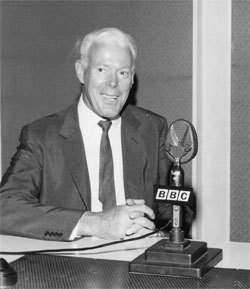Understanding radiation August 1988
Trevor Leggett was head of the Japanese Department of the BBC.

This is one of his broadcasts to Japan
ZUBARI for August 88
Hullo Listeners
Last month I mentioned to you that we had had an embarrassing report from the Government Nuclear Power safety Inspectors, which showed that people living round nuclear power stations get slightly less cancer than those who live elsewhere, away from nuclear power stations. No one was quite sure what to say about it. No one wanted to say that nuclear power stations are good for health – that would be absurd. But the figures seemed to show that.
Recently we have another, even more embarrassing case. At a big hospital in the country, there are just over 100 patients who every week have radiation treatment for cancer. Of course, the amount of radiation is strictly controlled. But it was discovered that the dial on the machine, which shows the amount of radiation, had become faulty; the last inspection of it had been nearly a month before. So, these patients had been receiving 25% more radiation than had been ordered for them by the doctors.
Immediately this was discovered, a famous specialist was called in from London to examine all the patients. None had suffered any definite damage that he could discover. But the surprising thing was: most of the patients reported that they had been suddenly getting much better’.
It is embarrassing, isn’t it? It seems that the prescribed amount of radiation was too little. But again, no one wants to say that.
What do you do with such cases in Japan? Probably you do the same thing as we do in Britain: we do not talk about it, and we soon forget we do not like to see doctors with red faces – we need to have faith in them.
© Trevor Leggett